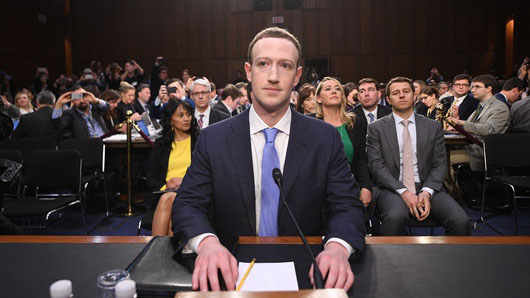by WorldTribune Staff, April 11, 2018
While Facebook CEO Mark Zuckerberg was being pummeled on Capitol Hill on April 10, a new poll revealed that the social networking behemoth has credibility issues with most Millennials.
During Zuckerberg’s Senate testimony, Sen. Ben Sasse, Nebraska Republican, said he worries about private entities such as Facebook being able to “make policies that maybe less than First Amendment-full spirit embracing” and “go from violent groups to hate speech in a hurry.”

Sasse asked: “You may decide or Facebook may decide it needs to police a whole bunch of speech that I think America might be better off by not having policed by one company that has a really large and powerful platform. Can you define hate speech?”
Zuckerberg, who in the past has indicated social media companies would rely on Artificial Intelligence (AI) to weed out hate speech, couldn’t define what hate speech is.
“Senator, I think that this is a really hard question and I think it’s one of the reasons we struggle with it. There are certain definitions that – that we – that we have around, you know, calling for violence or —”
Sasse stepped in to say that “[i]f somebody’s calling for violence, we – that shouldn’t be there” but the senator said he was concerned about “the psychological categories around speech” and how many Millennials are embracing the erosion of the First Amendment.
“You used language of safety and protection earlier,” Sasse said. “We see this happening on college campuses all across the county. It’s dangerous. 40 percent of Americans under age 35 tell pollsters they think the First Amendment is dangerous because you might use your freedom to say something that hurts somebody else’s feelings. Guess what? There are some really passionately held views about the abortion issue on this panel today. Can you imagine a world where you might decide that pro-lifers are prohibited from speaking about their abortion views on content — on your platform?”
Zuckerberg said that “I certainly would not want that to be the case” but Sasse countered: “But it might be really unsettling to people who have had an abortion to have an open debate about that? Wouldn’t it?”
Zuckerberg responded: “It might be, but I don’t think that…would fit any of the definition of what we have, but I do generally agree with the point that you’re making which is as we’re able to technologically shift towards especially having AI proactively look at content, I think that’s going to create massive questions for society.”
Sasse concluded by reiterating that it’s clear that violence plus human and sex trafficking “have no place on your platform, but vigorous debates, adults need to engage in vigorous debates.”
Meanwhile, the latest Harvard University Institute of Politics survey of 18-29-year-olds finds that just 4 percent said they trust Facebook “all the time.” Some 22 percent said they trust it “most of the time.”
But 23 percent said that they “never” trust Facebook and 48 percent said they trust Zuckerberg’s company “some of the time.”
John Della Volpe, Polling Director at Harvard Kennedy School’s Institute of Politics, said: “Weeks before the Cambridge Analytica story broke about the misuse of Facebook data, Harvard Public Opinion Project students were interested in young Americans views of technology companies engaged in the public realm. Using the same framework that we apply to public institutions and agencies, we find that Amazon and Google are held in relatively high esteem, especially when compared to Uber, Twitter, and Facebook. Approximately half as many young Americans indicate that they trust (all or most of the time) Uber, Twitter, and Facebook when compared to Amazon and Google, and nearly a quarter of the population (between 22 percent and 24 percent) never trust them.”
Subscribe to Geostrategy-Direct __________ Support Free Press Foundation
